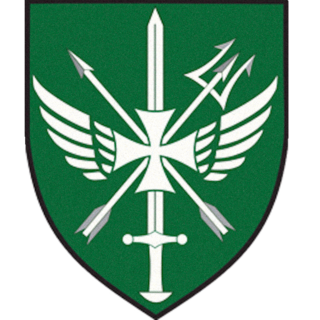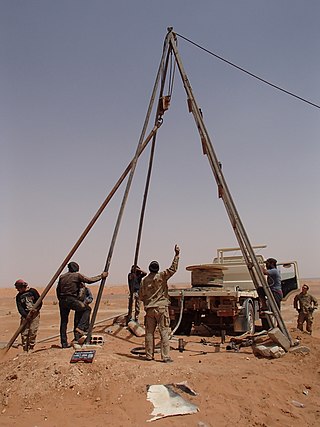Related Research Articles

The Armed Forces of Bosnia and Herzegovina is the official military force of Bosnia and Herzegovina. The BiH armed forces were officially unified in 2005 and are composed of two founding armies: the Bosniak and Croat Army of the Federation of Bosnia and Herzegovina (VFBiH) and the Bosnian Serbs' Army of Republika Srpska (VRS).
L-3 MPRI was a provider of private military contractor services with customers that included the U.S. Department of Defense, U.S. Department of State, U.S. Department of Justice, U.S. Department of Homeland Security, law enforcement agencies, foreign governments, government agencies, and commercial businesses.

The Burundian Civil War was a civil war in Burundi lasting from 1993 to 2005. The civil war was the result of longstanding ethnic divisions between the Hutu and the Tutsi ethnic groups. The conflict began following the first multi-party elections in the country since its independence from Belgium in 1962, and is seen as formally ending with the swearing-in of President Pierre Nkurunziza in August 2005. Children were widely used by both sides in the war. The estimated death toll stands at 300,000.

The Georgia Train and Equip Program (GTEP) was an American-sponsored 18-month, $64-million program aimed at increasing the capabilities of the Georgian armed forces by training and equipping four 600-man battalions with light weapons, vehicles and communications. The program enabled the US to expedite funding for the Georgian military for Operation Enduring Freedom.

The Jordanian Armed Forces (JAF), also referred to as the Arab Army, are the military forces of the Hashemite Kingdom of Jordan. They consist of the ground forces, air force, and navy. They are under the direct control of the King of Jordan who is the Supreme Commander of the Jordanian Armed Forces and acts by recommendation of the Defence Minister. The current Chairman of the Joint Chiefs of Staff is Major General Yousef Huneiti, who is also the King's military adviser.

Hezbollah, a Lebanese Shia Islamist political party and militant group, has an exceptionally strong military wing, thought to be stronger than the Lebanese Army and equivalent to the armed strength of a medium-sized army. A hybrid force, the group maintains "robust conventional and unconventional military capabilities", and is generally considered to be the most powerful non-state actor in the world.

The Libyan Army was the branch of the Armed Forces of the Libyan Arab Jamahiriya, the Libyan Arab Republic and the Kingdom of Libya responsible for ground warfare.
Central Intelligence Agency activities in Syria since the agency's inception in 1947 have included coup attempts and assassination plots, and in more recent years, extraordinary renditions, a paramilitary strike, and funding and military training of forces opposed to the current government.

The Georgian Land Forces are the land force component of the Defense Forces of Georgia. They are the largest branch of the military and constitute the bulk of the DFG.

James William Pardew Jr. was an American diplomat, international negotiator, military officer, and United States Ambassador to Bulgaria. After serving as a military intelligence officer in the United States Army for 28 years, Pardew entered the arena of international diplomacy with a heavy focus on the Balkans, where he was instrumental in coordinating agreements and peace resolutions, as well as heading major State Department programs such as the Bosnian Train-and-equip program.

The Georgian Special Operations Command are the special operations forces component of the Defense Forces of Georgia. They have been established to conduct special operations, special-and long range reconnaissance, military counter intelligence, counter terrorism, counter insurgency, amphibious and asymmetric warfare in and outside Georgia.

Foreign involvement in the Syrian civil war refers to political, military and operational support to parties involved in the ongoing conflict in Syria that began in March 2011, as well as active foreign involvement. Most parties involved in the war in Syria receive various types of support from foreign countries and entities based outside Syria. The ongoing conflict in Syria is widely described as a series of overlapping proxy wars between the regional and world powers, primarily between the United States and Russia as well as between Iran and Saudi Arabia.

Foreign fighters have fought on all four sides of the Syrian Civil War, as well both sides of the War in Iraq. In addition to Sunni foreign fighters, Shia fighters from several countries have joined pro-government militias in Syria, leftist militants have joined Kurdish forces, and other foreign fighters have joined jihadist organizations and private military contractors recruit globally. Estimates of the total number of foreign Sunnis who have fought for the Syrian rebels over the course of the conflict range from 5,000 to over 10,000, while foreign Shia fighters numbered around 10,000 or less in 2013 rising to between 15,000 and 25,000 in 2017.

On 22 September 2014, the United States officially intervened in the Syrian civil war with the stated aim of fighting the terrorist organization ISIS in support of the international war against it, code named Operation Inherent Resolve. The US currently continues to support the Syrian rebels and the Kurdish-led Syrian Democratic Forces opposed to both the Islamic State and Syrian president Bashar al-Assad.

Law enforcement in Syria is carried out by the Public Security Police, which is a force for general policing duties; internal security duties are carried out by different intelligence agencies. The Political Security Directorate is one of these agencies and is under the guidance of the Ministry of Interior of the Syrian government. The Directorate is used for covert intelligence gathering and internal security issues within Syria. Syria has been an INTERPOL member since 1953. Since the outbreak of the Syrian Civil War, much of Syria has been outside the control of the Syrian government. Currently, the Asayish are responsible for policing in the Autonomous Administration of North and East Syria, the Turkish-backed Free Syrian Police in areas under the Turkish occupation of northern Syria, and various Syrian opposition groups around Idlib

The Syrian Train and Equip Program is a United States-led military operation launched in 2014 that identified and trained selected Syrian opposition forces inside Syria as well as in Turkey and other US-allied states who would then return to Syria to fight the Islamic State of Iraq and the Levant. The program reportedly cost the US $500 million. It is a covert program, run by U.S. special operations forces, separate from Timber Sycamore, the parallel covert program run by the Central Intelligence Agency (CIA). As of July 2015, only a group of 54 trained and equipped fighters had been reported to have been deployed, which was quickly routed by al-Nusra, and a further 75 were reported in September 2015.

The 30th Infantry Division, commonly referred to as Division 30, also called the New Syrian Forces, was a Syrian rebel group formed by the United States. It was formed in mid-2015 during the Syrian Civil War with a specified purpose of fighting the Islamic State of Iraq and the Levant in northwestern Syria.
Saudi Arabia's involvement in the Syrian Civil War involved the large-scale supply of weapons and ammunition to various rebel groups in Syria during the Syrian Civil War.

Timber Sycamore was a classified weapons supply and training program run by the United States Central Intelligence Agency (CIA) and supported by some Arab intelligence services, including Saudi intelligence. Launched in 2012 or 2013, it supplied money, weaponry and training to Syrian opposition groups fighting Syrian government forces in the Syrian Civil War. According to US officials, the program was run by the CIA's Special Activities Division and has trained thousands of rebels. President Barack Obama secretly authorized the CIA to begin arming Syria's embattled rebels in 2013. The program became public knowledge in mid-2016.

Foreign fighters in the Syrian civil war have come to Syria and joined all four sides in the war. In addition to Sunni foreign fighters arriving to defend the Islamic State of Iraq and the Levant or join the Syrian rebels, Shia fighters from several countries have joined pro-government militias in Syria, and leftists have become foreign fighters in the Syrian Democratic Forces.
References
- ↑ The Bosnian Train and Equip Program: A Lesson in Interagency Integration of Hard and Soft Power By Christopher J. Lamb, with Sarah Arkin and Sally Scudder | Strategic Perspectives 15 | March 01, 2014 http://inss.ndu.edu/Media/News/Article/693534/the-bosnian-train-and-equip-program-a-lesson-in-interagency-integration-of-hard/
- ↑ "Helping Georgia?". Institute for the Study of Conflict, Ideology and Policy. Boston University. March–April 2002. Retrieved 2007-02-14.
- ↑ State.gov Georgia Train and Equip Program (GTEP) February 1, 2003 https://2001-2009.state.gov/r/pa/ei/pix/b/eur/18737.htm
- ↑ David Ignatius (20 August 2015). "Lessons from the Bay of Pigs in the Syrian 'Division 30' debacle". Washington Post. Retrieved 26 September 2015.
- ↑ Jim Miklaszewski (16 September 2015). "Small number of U.S.-trained Syrian rebels still fighting". NBC News. Retrieved 26 September 2015.
- ↑ "Rebel training program in Syria yields '4 or 5' fighters". MilitaryTimes. 16 September 2015. Retrieved 26 September 2015.